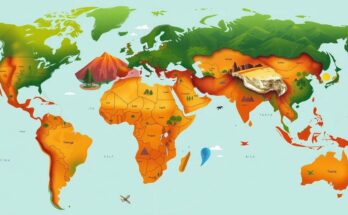The Democratic Republic of Congo has filed legal complaints against Apple in France and Belgium, alleging the tech company uses conflict minerals sourced from armed groups. Legal representatives claim this practice contributes to violence and exploitation in the region. While Apple defends its supply chain practices, authorities will investigate the claims for potential further legal action.
The Democratic Republic of Congo (DRC) has initiated legal proceedings in France and Belgium against Apple subsidiaries, alleging the company’s involvement with conflict minerals sourced from the region. Representing the Congolese government, legal representatives have claimed that Apple indirectly endorses violence by armed factions controlling mines in eastern DRC. Apple, in contrast, asserts its commitment to responsible supply chain practices by implementing rigorous monitoring and remediation measures to avoid conflict minerals. The French and Belgian authorities will investigate the allegations to determine their validity and the potential for further legal recourse.
The lawyers representing the DRC have accused Apple of benefiting from the mining of tin, tantalum, and tungsten in areas plagued by conflict, referring to these minerals as “blood minerals.” They allege that such mineral extraction finances armed groups and perpetuates violence, child labor, and environmental harm. In response to its 2023 report to the U.S. Securities and Exchange Commission, Apple emphasized its stringent standards for supply chain due diligence, whereby associates must undergo independent audits for conflict minerals compliance. Consequently, the company eliminated 14 smelters and refiners from its approved list for failing to adhere to responsible sourcing guidelines.
Historically, the eastern regions of the DRC have been central to the global minerals supply chain, contributing to ongoing tensions and conflicts. Advocacy groups argue that minerals from both legitimate and illegal sources flow through Rwanda, eventually reaching international markets and consumer products. In recent comments, the Rwandan government criticized the DRC’s allegations against Apple as mere media posturing, insisting that it does not engage in the trade of conflict minerals with the tech giant.
The Democratic Republic of the Congo is a significant source of key minerals, including tin, tantalum, and tungsten, often collectively referred to as the “3T minerals.” These resources have been linked to numerous human rights violations, including violence, child labor, and ecological degradation, primarily due to the control exerted by various armed groups within the region. The demand for these minerals has resulted in a complex web of supply chains that often blur the lines between legal and illegal extraction practices. As global awareness of these issues has risen, companies like Apple have come under scrutiny for their sourcing practices, prompting them to adopt more robust ethical sourcing standards and monitoring processes. In past declarations, major corporations have faced criticism and legal actions related to their complicity in these conflict-related issues, leading to increasing pressure from both governments and advocacy organizations to ensure responsible sourcing of minerals. The DRC has sought international legal avenues to hold corporations accountable for their supply chains’ impact on human rights and sustainable development, reflecting a broader trend of seeking justice for affected communities.
The allegations raised against Apple by the Democratic Republic of Congo underscore a critical issue concerning the usage of conflict minerals in global supply chains. As investigations proceed in France and Belgium, the case serves as a reminder of the ethical responsibilities that corporations bear in ensuring their supply sources do not contribute to conflict and human rights violations. Apple’s commitment to improving its mineral sourcing practices, though reiterated, will be closely scrutinized as the legal proceedings unfold, reflecting the heightened awareness and demand for corporate transparency in supply chain management.
Original Source: www.bbc.com




